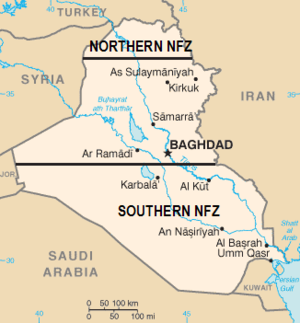March 2003 was when the U.S. invaded Iraq, but preparatory military operations started several months before. Both England’s Royal Air Force (RAF) and the U.S. Air Force used the no fly zones over southern and northern Iraq as the pretext for a series of large bombing raids to destroy the country’s radar, air defense system, and other targets beginning in mid-2002.
The no fly zones over northern and southern Iraq were created after the 1991 Gulf War and were used to justify the bombing campaign before the 2003 invasion of Iraq (Wikipedia)
Around May 2002 the RAF and U.S. Air Force began doubling their bombings of Iraq. The U.S. and England claimed that they were only responding to Iraqi fire over the two no fly zones, but the American military later admitted that they were taking advantage of the situation to strike Saddam. In December for example, U.S. planes were fired upon over Kurdistan, but then struck southern Iraq in retaliation.
The two countries used twice as many bombs in the second half of 2002 as all of 2001. In September 2002 for instance, the RAF launched a 100 plane raid on Iraq’s western air defense system. Many of these attacks were coordinated with U.S., Australian, Jordanian, and British special forces and commandos, plus CIA officers who were operating within Iraq from August 2002 until the U.S. invasion in March 2003. The raids were aimed at Iraq’s command and control facilities, radar stations, communication centers, and Republican Guard units.
The attacks picked up when United Nations inspectors returned to Iraq at the end of 2002. In January 2003, when the inspectors released their initial findings to the U.N.’s Security Council that they had found no evidence of weapons of mass destruction or a nuclear program, the U.S. and England were carrying out their heaviest bombing to date. In total, a U.S. Air Force general said that the two countries flew 21,736 sorties against Iraq, dropping 606 bombs on 391 targets from 2002 to March 2003.
The American Congress authorized the use of force against Iraq on October 16, 2002. Afterward President Bush said, “I have not ordered the use of force. I hope the use of force will not be necessary. Our goal is to fully and finally remove a real threat to world peace and to America. Hopefully this can be done peacefully. Hopefully we can do this without any military action.” What the president stated wasn’t quite true. The White House had actually started an air campaign against Iraq five months before the Congressional vote. Publicly it said that it would work with allies and eventually the U.N. to resolve the conflict. On the other hand, it was moving ahead with military planning, stepping up air sorties, and infiltrating forces into Iraq all of which made the invasion more inevitable. In fact, the U.S. was hoping that the strikes might provoke Saddam Hussein to retaliate, which would provide a justification for war. That didn’t happen, but the administration eventually got what it wanted, and the bombings reduced the number of targets it had to hit when the invasion finally started.
SOURCES
Danner, Mark, “The Secret Way to War,” New York Times Review of Books, 6/9/05
Donnelly, John and Allard, Tom, “Undercover war begins as US forces enter Iraq,” Boston Globe, 1/6/03
Gordon, Michael, "U.S. Air Raids in '02 Prepared for War in Iraq," New York Times, 7/20/03
Gordon, Michael and Risen, James, “Report’s Findings Undercut U.S. Argument,” New York Times, 1/28/03
Loeb, Paul Rogat, “Iraq war started too early,” San Francisco Chronicle, 6/19/05
Loeb, Vernon, “Airstrikes in Southern Iraq “No-Fly” Zone Mount,” Washington Post, 1/15/03
Rangwala, Glen, Hurd, Nathaniel, and Millar, Alistair, “A Case For Concern, Not A Case For War,” Middle East Report Online, 1/28/03
Scahill, Jeremy, “The Other Bomb Drops,” The Nation, 6/1/05
Smith, Michael, “General admits to secret air war,” Times of London, 6/26/05
- “RAF bombing raids tried to goad Saddam into war,” Sunday Times, 5/29/05
Subscribe to:
Post Comments (Atom)
Review Lloyd Gardner, The Long Road To Baghdad, A History Of U.S. Foreign Policy From The 1970s To The Present, The New Press, 2008
Rutgers University Professor Lloyd Gardner attempted to explain the larger ideas behind the 2003 invasion of Iraq in The...

-
Dr. Michael Izady of Columbia’s School of International and Public Affairs recently gave an interview to the Swiss-based International Relat...
-
Napoleoni, Loretta, Insurgent Iraq, Al Zarqawi and the New Generation , New York: Seven Stories Press, 2005 In Insurgent Iraq autho...
-
Professor Nadje Al-Ali is a professor of gender studies at SOAS, University of London. She has authored several books and articles...




No comments:
Post a Comment